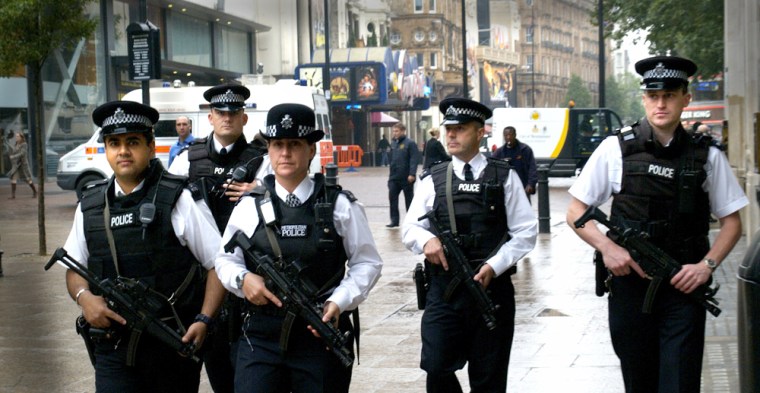Police are working urgently to break suspected bomber Yasin Hassan Omar, drawing on years of experience in fighting the Irish Republican Army as they seek clues to help them hunt down at least three other bombers.
But Omar — who was apparently prepared to die for his beliefs — represents a new challenge for British police, who have never before been confronted by suicide bombers on their soil. The 24-year-old Somali Muslim is accused of trying to blow up the Warren Street Tube station last Thursday, but the bomb failed to fully detonate.
Omar’s religious and political convictions could motivate him to stonewall interrogators, but the prospect of a long prison term might prompt him to talk, said Charles Shoebridge, an MSNBC analyst and former counterterrorism intelligence officer with London police.
“A potential suicide bomber is prepared to die, and thereby gain benefits such as an immediate entry to paradise,” Shoebridge said. “Clearly the prospect of 30 to 40 years in jail, particularly for a young man, might be a different matter. And consequently, it may be that the suspect will consider cooperating with police.”
Police rules dictate Omar had to be given eight hours sleep before formal questioning following his arrest at 4:30 a.m. Wednesday. He will have access to a toilet and washing facilities, and be given two light meals and one full meal in every 24 hour period, as well as liquids upon request.
Police bound by rules
After his rest, questioning would have gone for about six hours, with breaks and an attorney present, according to the guidelines.
Stung by allegations of brutality and torture in the 1970s, particularly in the case of IRA suspects known as the “Birmingham Six,” police are today bound strictly by revised rules on how they can treat suspects.
The Birmingham Six were jailed for life in 1975 for two pub bombings in Birmingham in 1974, which killed 21 and wounded 182. After serving years in prison, their convictions were overturned in 1991, when evidence showed police beat confessions out of them.
As well as seeking clues to the identities of the July 21 attacks, police will be seeking information on possible links to the July 7 bombings of the London transit system that killed 56 people, including four bombers.
‘Shock of capture’
But it may be that police already got their best information from Omar in the minutes after his arrest, when he was suffering “the shock of capture,” and they would have been permitted to question him without an attorney present, a former British military police and intelligence officer said.
“I would suspect that there may have been some ‘hot questioning’ because, obviously, he’s in a state of shock,” said the former officer, who worked in Northern Ireland and is experienced in interrogation techniques used with IRA suspects. He spoke on condition of anonymity because of the sensitive nature of his former work.
“In years gone by, sleep deprivation, food deprivation, being made to stand up for hours — that wore you down,” he said. “That doesn’t happen any more. If anything, the more high profile the case, the nicer the police are going to be.”
He also noted the investigators would be mindful their work must stand up in court.
Police have not said how they located Omar, a Somali citizen with British residency who was arrested in Birmingham, a city 120 miles northwest of London.
MSNBC's Shoebridge said other suspects might have talked. “Those on the periphery of terrorist operations and yet still facing the prospects of long jail sentences are more likely to give police useful information than the terrorists themselves,” he said. “Experience certainly shows that from the IRA days.”
Police chief: New attack ‘does remain possible’
Police chief Ian Blair said his officers are still looking for a suspect identified as Muktar Said Ibrahim, 27, and at least two other men in the July 21 failed attacks. He said a fifth bomb was found in a park and destroyed, raising fears there could also be a fifth suspect.
He called it “a race against time” to find the suspected bombers, noting Thursday: “It does remain possible that those at large will strike again.”
Omar is being held in Paddington Green police station, which is equipped with some of Britain’s highest-security facilities. The station was designed to cope with the IRA threat, and was used for the interrogation of top IRA suspects. It became a target in 1992, when the IRA blew up a phone booth outside the station, wounding one person.
Police have probably sought advice from forensic psychologists in places like Israel where there is wide experience with suicide bombers, Shoebridge said.
“It would be massively beneficial for the police and the public if the suspect were to talk,” he said. “But it’s probably the case that ... the bulk of their information is still likely to come from the products of traditional detective and intelligence work.”
